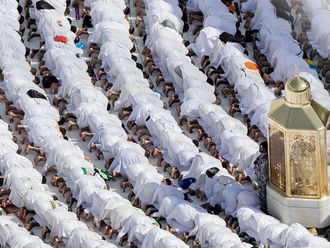Manila: Philippine Airlines, the country's flag carrier, continued operation on Wednesday but 102 flights remained cancelled as labour row between management and ground crew intensified since the start of a sit down strike on Tuesday.
Striking ground crew of the Philippine Airlines (PAL) who belong to the PAL Employees Association (PALEA) were bodily taken by the police out of the check in counters late Tuesday, but they continued holding a peaceful strike near PAL's terminal two at the Ninoy Aquino International Airport (NAIA) on Wednesday.
"Taking us out where we held a sit-down strike and replacing us with temporary personnel who were not trained to do our job would not solve the labour problem that PAL started when it embraced a policy of illegal lock-out, by replacing us with outsourced personnel (starting October 1)," explained PALEA president Gerry Rivera.
"Our lawyers are studying our options such as charges to file against PAL management for not allowing us to return to work (because of the sit-down strike)," Rivera said, adding that PALEA is waiting for the Court of Appeals to rule on a request to stop and call illegal PAL's outsourcing of work of hired ground crewmen.
The striking workers were threatened with holiday leave with pay until September 30; disciplinary action for holding a sit-down strike without notice; and deductions from their separation pay.
The striking workers were taken out of the check-in counter late Tuesday night, allowing PAL to dispatch seven flights out of 60 flights that were cancelled Tuesday morning.
On Wednesday, sixty-two local flights and 42 international flights were cancelled again, prompting PAL spokesperson Cielo Villaluna to admit that operations remained almost standstill at "35 percent" with about 14,000 passengers affected by the ongoing labour row.
PAL resumed its daily flight to San Francisco and Los Angeles in the United States on Wednesday, and Villaluna said that operations will get back to normal, in time.
However, chaos prevailed and stranded passengers remained angry even after PAL announced that several flights could resume.
Newly hired workers could not work properly; computers, passenger vehicles, and deck loaders for cargo were not operating properly. Villaluna blamed the protesting workers for these things.
In response, labour leader Rivera said that PAL management hired new and cheaply paid workers who were not trained to work as ground crew.
"No one disabled the equipment. The newly hired workers were dysfunctional," Rivera added.
In an effort to save $ 15 million and reduce human resources to 5,000, PAL decided to terminate on October 1, 2,600 ground crew men in charge of airport services, reservation, and in-flight catering.
Workers received notices of termination last week.
About seven percent of employed ground crew members applied to PAL's chosen service provider that offered salaries 40 percent lower than the prevailing salary of PAL's hired employees.
PAL declared losses of $ 312 million in 2008-2009.
PAL's rival, Cebu Pacific, has overtaken the country's flag carrier in terms of number of passengers served.












